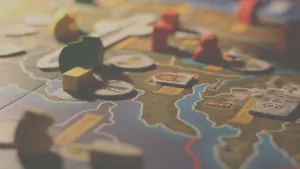You may have noticed that right now people play more board games that they ever have before. But, maybe you don’t quite get the hype around board games yet.
In this article we try to convince you to jump on the board games band wagon, with our top 7 reasons why you should play more board games.
 The first thing we need you to realize is that board games are so much better than they used to be. If you’re still thinking about Monopoly, Risk or Settlers of Catan, you’re missing out on a whole new generation of board games.
The first thing we need you to realize is that board games are so much better than they used to be. If you’re still thinking about Monopoly, Risk or Settlers of Catan, you’re missing out on a whole new generation of board games.
As with any technology, it gets better over time. The same is true for board games. The classics will always be classics, but the new generation of board games solves a lot of issues they had.
For example, the classic board games are all very confrontational. In Monopoly you’re trying to bankrupt each other, in Risk you try to conquer the world. But what if you don’t like confrontation? Then, my friend, there’s a new genre of board games for you: cooperative board games. Cooperative board games let you play with your friends, instead of against them, to beat the game as a team. If that sounds better to you, head over to our article about the best cooperative board games in 2020.
Or maybe you remember the hidden role game Werewolves. That’s an absolute hall of fame level classic board game. But, do you remember that time that you died early on and you had to wait for an hour until the game ended? And you couldn’t even talk in the mean time so you wouldn’t ‘disrupt the game’? Well, that blows. So, new generation board game designers did away with player elimination in the new version of the Werewolves: One Night Ultimate Werewolf.
There’s many more issues of classic board games that are solved in the new generation of board games, that you can read all about in our article on why board games are making a comeback. Generally, there’s just more board games out there so there’s something to like for everyone, and the games don’t have obvious design flaws that can make them drag on for hours and hours.
2. Board Games Develop Cognitive And Social Skills
 It’s no secret that children can develop a wide range of cognitive and social skills through board games.
It’s no secret that children can develop a wide range of cognitive and social skills through board games.
Cognitively, classic board games such as chess require you to understand rules, to think abstractly and to plan ahead. And many new generation board games foster creative thinking, such as in the word association game Codenames for example.
Socially, all board games teach you to patiently wait for your turn, to leave room for others to play as well, to guess what moves the other players will make, and to be a good winner and loser. And cooperative board games challenge you to communicate your ideas to others.
The most challenging social games are known as social deduction games, in which players assume secret roles and then try to discover from each other who they are. This requires some real theory of mind; you try to understand who the other players are, but also who they think you are, and how this influences their actions. If you’re in for a real challenge of your social skills, check out our article on our favorite social deduction games.
3. Board Games Can Teach You About Other Cultures

What’s the quintessential board game?
You probably thought of chess or monopoly, right? Both are valid answers – but they’re also completely culturally determined. They wouldn’t answer that in China, Brazil, Africa, Japan or the Middle East.
We wrote a post on the most popular board games in different cultures. Some of them you can guess: China loves Go, a game that ties in well to their cultural appreciation for abstract thinking.
But did you know that in India the most popular board game is Carrom, which is something like a combination of billiards and shuffleboard? It’s a game that is played by all ages, often in families or other large groups, so it ties into the Indian cultural heritage of collectivism. (And to me the game also just looks amazing, so I have a feeling it might catch on in the west sooner or later.)
I think there’s something important to be learned from getting a different perspective on play, competition, and winning and losing, through the board games of other cultures.
4. You Can Learn To Interact With Complex Problems
 A recent study found that board games are beneficial tools in teaching children about complex interdisciplinary subjects such as sustainability. They write that (emphasis mine):
A recent study found that board games are beneficial tools in teaching children about complex interdisciplinary subjects such as sustainability. They write that (emphasis mine):
Sustainability is a complex and interdisciplinary topic which can be challenging to teach. (…) games have recently emerged as promising tools to engage students by immersing them in various complex situations and giving them an opportunity to play an active role in decision-making
And although I’m not a student anymore, I can certainly second their finding from my personal experience.
When the real life pandemic started, my girlfriend and I bought Pandemic Legacy, which is one of those new generation of board games we talked about. I do think it helped me to better understand the dangers of exponential growth of a virus, and how you can lose control if you don’t act quickly enough (of course we learned this the hard way by losing the first game due to our rather laissez-faire attitude).
5. You Can Safely Play Board Games At Home
Obviously, in 2020 everyone is looking for something to do at home, so we don’t get bored out of our minds. It seems that many people went directly to board games.
This makes sense to us, as board games provide a shared activity that breaks up the continuous always-the-same slurry time soup that we all live in today.
6. Board Games Get You Offline
 This is a trend that was already going on before the pandemic started: people are looking for things to get them offline.
This is a trend that was already going on before the pandemic started: people are looking for things to get them offline.
At this point it’s obvious that many of us spend more time online and on our phones than we would ideally like to. And this makes it harder to connect to our family and friends as well. Board games give us a way to pull everyone together, into the real world, into the here and now.
7. They're A Family Activity (Now A More Fun One)
Of course the way in which board games rose to cultural prominence was as a family activity, and that’s how many families still use them.
Our only beef is that many families are still playing the classic board games: Monopoly, Risk and Settlers of Catan. And we get it, these games are nostalgic, and they’re still pretty fun. But there’s better alternatives out there.
Get one of those cooperative games we keep talking about, or a simple escape room game for at home. Or even just one of the newer party games for your kids to play when they have friends over. The newer board games just provide an even better family experience; don’t let your kids miss out on that.
Rounding Up
So that’s our top 7 reasons to play more board games right now! We hope we convinced you to play more board games, and especially that you pick up one of the new generation of board games if you don’t have one yet.
As always, if you have any comments or suggestions, please let us know through our contact form.
